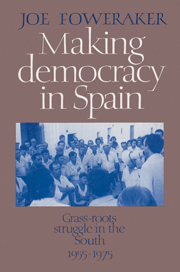Book contents
- Frontmatter
- Contents
- Preface
- Introduction: personal networks, political strategies and the making of democracy
- PART I PERSONAL NETWORKS, POLITICAL TRADITIONS AND STATE POLICIES
- 1 Unquiet hearts: the primitive world of the first political men
- 2 The burden of hopes and hatreds: ideological traditions in clandestine circumstance
- 3 Oligarchic unity and working-class divisions: a political economy of E1 Marco de Jerez
- 4 Political clans and capitalist planning: a political economy of Francoism
- PART II SYNDICAL PRACTICES, SOCIAL STRUGGLES AND POLITICAL PROTESTS
- PART III POLITICAL PRACTICES, REPRESSION AND STRATEGIC RESPONSES
- PART IV POLITICAL STRATEGIES AND THE DEMOCRATIC PROJECT
- Bibliography
- Index
4 - Political clans and capitalist planning: a political economy of Francoism
Published online by Cambridge University Press: 29 September 2009
- Frontmatter
- Contents
- Preface
- Introduction: personal networks, political strategies and the making of democracy
- PART I PERSONAL NETWORKS, POLITICAL TRADITIONS AND STATE POLICIES
- 1 Unquiet hearts: the primitive world of the first political men
- 2 The burden of hopes and hatreds: ideological traditions in clandestine circumstance
- 3 Oligarchic unity and working-class divisions: a political economy of E1 Marco de Jerez
- 4 Political clans and capitalist planning: a political economy of Francoism
- PART II SYNDICAL PRACTICES, SOCIAL STRUGGLES AND POLITICAL PROTESTS
- PART III POLITICAL PRACTICES, REPRESSION AND STRATEGIC RESPONSES
- PART IV POLITICAL STRATEGIES AND THE DEMOCRATIC PROJECT
- Bibliography
- Index
Summary
A man without work loses self-esteem: he who has no work has no hope.
Vineyard worker from El Marco de JerezThe political world of Europe in the nineteenth century was marked historically by the progressive emergence of liberal forms of the capitalist State throughout the continent. But the political picture was different in Spain, where a monarchical clan remained in charge of what Weber would call a patrimonial State system (Brenan:1976). Industrial enterprise in the country was spotty and stagnating; and so, in a manner more reminiscent of Latin America than of Europe, the transition to capitalism tended to take place under the aegis of the banks, allied to foreign capital. Economically, this led to such commonplace phenomena of underdevelopment as a massive programme of railroad construction, financed by foreign capital, which was so far ahead of the immediate needs of the economy that financial crisis ensued. Politically, the transition was so far contaminated by feudal remnants, including the institutional identification of the Church with the State system, that such change that occurred in the society itself was not only painfully slow but also remained subject to the reactivation of absolutist patterns of dominance (Vilar:1977). In short, capitalism appeared to take root without any corresponding revolution in the exercise of political power.
- Type
- Chapter
- Information
- Making Democracy in SpainGrass-Roots Struggle in the South, 1955–1975, pp. 61 - 76Publisher: Cambridge University PressPrint publication year: 1989



